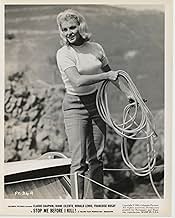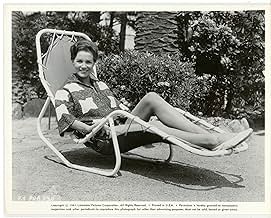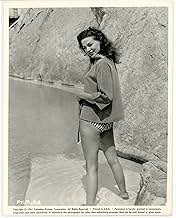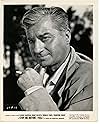IMDb-BEWERTUNG
6,0/10
1145
IHRE BEWERTUNG
Nach einem traumatischen Autounfall fährt ein Rennfahrer zur Côte d'Azur, um sich zu erholen, wird jedoch von dem Drang geplagt, seine Frau zu erwürgen.Nach einem traumatischen Autounfall fährt ein Rennfahrer zur Côte d'Azur, um sich zu erholen, wird jedoch von dem Drang geplagt, seine Frau zu erwürgen.Nach einem traumatischen Autounfall fährt ein Rennfahrer zur Côte d'Azur, um sich zu erholen, wird jedoch von dem Drang geplagt, seine Frau zu erwürgen.
Françoise Rosay
- Madame Prade
- (as Francoise Rosay)
Andre Charisse
- Waiter at Villa
- (Nicht genannt)
Roy Everson
- Onlooker at London Crash
- (Nicht genannt)
Aileen Lewis
- Onlooker at Crash
- (Nicht genannt)
Dickie Owen
- London Taxi Driver
- (Nicht genannt)
Empfohlene Bewertungen
Before addressing the acting, which I regard as uniformly superb throughout, I should add my agreement with several other reviewers that there are several scenes in this film that are simply repetitive, so that it might have been more effective with about 15 or 20 minutes cut out of it. However, it is still highly effective as is, due to the acting of four of the five principals, those being Diane Cilento, Ronald Lewis, Claude Dauphin and Bernard Braden. The fifth, the damned-near immortal Francoise Rosay is fine, but really contributes little to the film from an acting standpoint; she simply has little to do and nothing to act. It's the kind of role that in an American film would have been given to Argentina Brunetti or Celia Lovsky!
I'd never heard of this movie before - surprisingly, since I am a devotee of British film and acting from all periods and because this is, at least in the three leading roles, an impressive cast listing. I thought Cilento's accent was just fine throughout (if I didn't know her from anything else, I would never have thought of her as coming from Down Under); to me, it sounded Italian, but she uses a lot of French phrases and speaks French to others (the film takes place in France and England), so maybe that has confused other reviewers. The character's first name, "Denise", certainly sounds French rather than Italian, but that doesn't mean too much in a world where we have a noted Irish operatic baritone named Bruno Caproni! As with everything I've ever seen her in, Cilento is wonderful throughout, and very sexy in both voice and aspect. She beautifully captures both the character's love for, and fright of, her seemingly demented husband. Claude Dauphin was a pretty famous actor on both sides of the Atlantic at this time, and this is by far the best outing I have seen from him in an English-language film. I used to find him fairly hard to understand in our language, but not so in this one - and he has some really difficult dialogue (lots of it, and much of it replete with scientific jargon) to get through. He captures the psychiatrist's intelligence, egotism and kindness throughout, yet we are aware that there may be more to him than he shows on the surface. As for Ronald Lewis, I could never understand why he never became anything like an international star. He was a very good actor, with a resonant voice and wide emotional range, both very handsome and very macho (like good old George O'Brien, somebody always got him to remove his shirt in the course of a movie), and quite volatile as both villains and heroes - kind of like a visual and emotive cross between Stephen Boyd and Kirk Douglas. (This may have carried over to his personal life, as he did commit suicide when only 53.) Anyway, this is a very difficult role to play convincingly and he does it about as well as can be imagined (in fact, in this film he really did remind me of Stephen Boyd). A bit of a surprise is Bernard Braden, a Canadian actor with whom I was almost totally unfamiliar, but who plays an old friend of Lewis's who is about the only completely normal character in the film (Cilento is lovable, but hardly normal, unless one considers going to bed with someone you know may strangle you in the middle of the night to be normal), but he plays him extremely well and with a kind of of Everyman quality and lack of flair. Rosay, as I already said, is wasted here, but her English is actually less accented than is Dauphin's, perhaps reminding us that this most quintessentially French of French actresses did appear in a good number of English-language films during her long career.
With a few outdoor scenes deleted, this film could almost serve as a play for three major acting talents, so it is a bit 'talky', but the talk is pretty solid. Anyway, there is lots of emotional excess here and the actors are really up to it, and despite its overlong process in reaching a somewhat surprising, if well thought out, denouement, it maintains and builds interest and suspense throughout. It probably deserves a 6 rating, but being performance oriented, I give it an 8. If you enjoy watching good actors act, this is a film for you. Suspend your disbelief and just enjoy it.
I'd never heard of this movie before - surprisingly, since I am a devotee of British film and acting from all periods and because this is, at least in the three leading roles, an impressive cast listing. I thought Cilento's accent was just fine throughout (if I didn't know her from anything else, I would never have thought of her as coming from Down Under); to me, it sounded Italian, but she uses a lot of French phrases and speaks French to others (the film takes place in France and England), so maybe that has confused other reviewers. The character's first name, "Denise", certainly sounds French rather than Italian, but that doesn't mean too much in a world where we have a noted Irish operatic baritone named Bruno Caproni! As with everything I've ever seen her in, Cilento is wonderful throughout, and very sexy in both voice and aspect. She beautifully captures both the character's love for, and fright of, her seemingly demented husband. Claude Dauphin was a pretty famous actor on both sides of the Atlantic at this time, and this is by far the best outing I have seen from him in an English-language film. I used to find him fairly hard to understand in our language, but not so in this one - and he has some really difficult dialogue (lots of it, and much of it replete with scientific jargon) to get through. He captures the psychiatrist's intelligence, egotism and kindness throughout, yet we are aware that there may be more to him than he shows on the surface. As for Ronald Lewis, I could never understand why he never became anything like an international star. He was a very good actor, with a resonant voice and wide emotional range, both very handsome and very macho (like good old George O'Brien, somebody always got him to remove his shirt in the course of a movie), and quite volatile as both villains and heroes - kind of like a visual and emotive cross between Stephen Boyd and Kirk Douglas. (This may have carried over to his personal life, as he did commit suicide when only 53.) Anyway, this is a very difficult role to play convincingly and he does it about as well as can be imagined (in fact, in this film he really did remind me of Stephen Boyd). A bit of a surprise is Bernard Braden, a Canadian actor with whom I was almost totally unfamiliar, but who plays an old friend of Lewis's who is about the only completely normal character in the film (Cilento is lovable, but hardly normal, unless one considers going to bed with someone you know may strangle you in the middle of the night to be normal), but he plays him extremely well and with a kind of of Everyman quality and lack of flair. Rosay, as I already said, is wasted here, but her English is actually less accented than is Dauphin's, perhaps reminding us that this most quintessentially French of French actresses did appear in a good number of English-language films during her long career.
With a few outdoor scenes deleted, this film could almost serve as a play for three major acting talents, so it is a bit 'talky', but the talk is pretty solid. Anyway, there is lots of emotional excess here and the actors are really up to it, and despite its overlong process in reaching a somewhat surprising, if well thought out, denouement, it maintains and builds interest and suspense throughout. It probably deserves a 6 rating, but being performance oriented, I give it an 8. If you enjoy watching good actors act, this is a film for you. Suspend your disbelief and just enjoy it.
"Stop Me Before I Kill" or "The Full Treatment" is a 1960 film with a screenplay by Val Guest, who also directed.
The story concerns a famous race car driver, Alan Colby (Ronald Lewis), who was involved in a terrible car crash with his wife Denise (Diane Cilento). He is unable to race, and he and Denise go to the south of France on vacation.
Alan goes through swift mood shifts - the slightest word can set off his temper. And he keeps being tempted to strangle his wife - in fact, he nearly does a couple of times.
This, of course, is where one has to suspend belief because why the heck would she stay with someone who has attempted to strangle her and whose temper flares at the drop of a hat? I understand women in abusive situations, but I don't know, my husband trying to kill me takes it to a new level.
A psychiatrist they meet, Dr. David Prade (Claude Dauphin) offers to help. Alan is hesitant, but once back in London, where Prade has also returned, he agrees. At the end of the treatment, he feels that he is cured. He is able to get back on the racing track and has no temptation to hurt Denise.
Right before he is to leave for a race, Alan wakes up and finds that Denise is not there. In fact, all the evidence points to the fact that she has been murdered.
This was a very good story that suffered from an unbalanced script. The film went on too long, and the psychiatric scenes were endless. Diane Cilento is a beautiful and heartfelt Denise, Claude Dauphin is likable, and Ronald Lewis for me lacked subtlety in a difficult role. A good-looking man, in the beginning of the film, he reminded me of David Hasselhoff; fortunately, the resemblance faded somewhat.
Sadly Ronald Lewis committed suicide in 1982, bankrupt and his career in the doldrums.
In other hands and a bigger budget, this could have been an excellent film. However it's worth seeing for the story.
The story concerns a famous race car driver, Alan Colby (Ronald Lewis), who was involved in a terrible car crash with his wife Denise (Diane Cilento). He is unable to race, and he and Denise go to the south of France on vacation.
Alan goes through swift mood shifts - the slightest word can set off his temper. And he keeps being tempted to strangle his wife - in fact, he nearly does a couple of times.
This, of course, is where one has to suspend belief because why the heck would she stay with someone who has attempted to strangle her and whose temper flares at the drop of a hat? I understand women in abusive situations, but I don't know, my husband trying to kill me takes it to a new level.
A psychiatrist they meet, Dr. David Prade (Claude Dauphin) offers to help. Alan is hesitant, but once back in London, where Prade has also returned, he agrees. At the end of the treatment, he feels that he is cured. He is able to get back on the racing track and has no temptation to hurt Denise.
Right before he is to leave for a race, Alan wakes up and finds that Denise is not there. In fact, all the evidence points to the fact that she has been murdered.
This was a very good story that suffered from an unbalanced script. The film went on too long, and the psychiatric scenes were endless. Diane Cilento is a beautiful and heartfelt Denise, Claude Dauphin is likable, and Ronald Lewis for me lacked subtlety in a difficult role. A good-looking man, in the beginning of the film, he reminded me of David Hasselhoff; fortunately, the resemblance faded somewhat.
Sadly Ronald Lewis committed suicide in 1982, bankrupt and his career in the doldrums.
In other hands and a bigger budget, this could have been an excellent film. However it's worth seeing for the story.
Val Guest directed this psychological suspense yarn about a race car driver(played by Ronald Lewis) who is having huge stress issues after nearly cracking up in a car race. He takes his wife(played by Diane Cilento) on a trip to the South of France for a vacation, but is still plagued by stress and other psychological issues, so agrees to see a psychiatrist(played by Claude Dauphin) but complications ensue, as things(of course) are not all that they seem. Misfired attempt at suspense has a good cast but is fatally overlong and far too talky, with nothing in the story justifying this over-length, as film becomes quite tedious.
Still recovering from serious head injuries sustained in a car crash, motor racing driver Alan Colby and his wife Denise go on holiday to the South of France. There, Alan is suddenly and unexpectedly struck with a compulsion to strangle his wife. Hearing about this, Dr. David Prade, a local psychiatrist, offers to help, but his offer is rejected by Alan and he and Denise return to London. The psychiatrist follows them there, convinced that sooner or later his services will be needed and that he should be close at hand. At first, all seems well with Alan, but then one morning he wakes from a long sleep to find that Denise has disappeared. Worse, all the evidence points to his having murdered her.
Beautifully filmed in black-and-white MegaScope by the great Gil Taylor and masterfully directed by Guest, who was always at his best working on suspense films, "The Full Treatment" is a minor classic.
Beautifully filmed in black-and-white MegaScope by the great Gil Taylor and masterfully directed by Guest, who was always at his best working on suspense films, "The Full Treatment" is a minor classic.
This is a surprisingly good film and effective thriller but someone should have advised writer/director Val Guest that it really was a little too long. Very simple to put right too, because it is clear there is just a little too much of the 'going crazy' scenes in the first half and maybe a little bit too drawn out and twisty an ending. Otherwise its great, I wasn't particularly one over by Ronald Lewis if effectively menacing at times, but Claude Dauphin is great and Diane Cilento marvellous in one of her finest roles. I enjoyed the premise and particularly the psychiatric scenes, bit surprised by the appearance of the CO2 canister, but overall very involving with plenty of changes in pace and scenery. Fifteen/twenty minutes snip and this would be far more successful. Shame.
Wusstest du schon
- WissenswertesSean Connery visited the set during filming in the South of France. He was dating Diane Cilento at the time. They married the following year.
- PatzerNear the beginning of the film, after Alan successfully passes the truck and pulls over to the side of the road, he leaps out of the car without setting the parking brake. Denise is seen pulling on the handbrake, but the car continues to move until the end of the shot, with the front of the car going past the roadside sign. In the next shot, the car has been moved back so that its front is even with the sign.
- Zitate
David Prade: You know, only the unsuccessful murderers disclose their crimes.
Alan Colby: And the successful ones?
David Prade: Well, they draw their reward from a feeling of personal power.
- Alternative VersionenColumbia cut the film to 93 min when they released it in the US, but the TV arm of Columbia, Screen Gems, syndicated a toned down 107 min. print to US television for years.
- VerbindungenReferenced in DVD/Lazerdisc/VHS collection 2016 (2016)
Top-Auswahl
Melde dich zum Bewerten an und greife auf die Watchlist für personalisierte Empfehlungen zu.
- How long is Stop Me Before I Kill!?Powered by Alexa
Details
- Erscheinungsdatum
- Herkunftsland
- Sprachen
- Auch bekannt als
- Obsesión diabólica
- Drehorte
- Albert Embankment, Lambeth, London, England, Vereinigtes Königreich(Ronald and Diane's London apartment)
- Produktionsfirmen
- Weitere beteiligte Unternehmen bei IMDbPro anzeigen
- Laufzeit
- 1 Std. 48 Min.(108 min)
- Farbe
- Seitenverhältnis
- 2.35 : 1
Zu dieser Seite beitragen
Bearbeitung vorschlagen oder fehlenden Inhalt hinzufügen




















